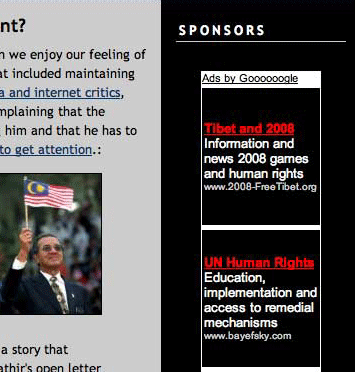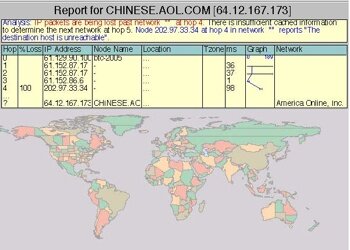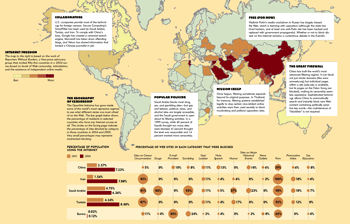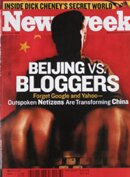AsiaPundit is pleased to report that government-blocked websites such as the BBC’s news portal and HRI China can be accessed on mobile devices in China with the installation of the Opera Mini browser.

While phones with WAP capabilities have built-in browsers, these have to go through the same firewalls that plague China’s conventional internet. The Opera Mini, however, “uses a remote server to pre-process Web pages before sending them to your phone.”
From the Opera Mini Wikipedia entry:
Unlike normal web browsers, Opera Mini fetches all content through a proxy that runs the layout engine of the Opera desktop browser. The engine on the proxy server reformats webpages into a width that is suitable for small screens using Opera’s Small Screen Rendering. The content is compressed, then delivered to the phone in a markup language called OBML (Opera Binary Markup Language). When the content reaches the phone it has been reduced in size by typically 70-90%.
This was designed to improve loading speed and rendering of content for the small screen. However, the end effect is the same as what can be achieved using proxy servers or web-based services such as Anonymouse and Virtual-Browser. Unlike the Anonymouse service, which is disabled by the Great Firewall’s keyword filtering, the Opera Mini was able to load one particular banned website without any time-out errors.
Viewing web pages through a WAP connection is a slow and expensive process, so this will not bring freedom of information to the masses. The government could also mandate a block on Opera’s server should use of the service become widespread enough to be considered a problem.
Still, AsiaPundit expects that in a few short years more Chinese will be accessing the internet through mobile devices than through PCs (the organic evolution of mobile technologies is a more important revolution than the $100 PC). With that, the discovery of a small chink in the armor should be welcome.
Technorati Tags: asia, censorship, china, east asia, internet, northeast asia, opera

 Along with the increasing popularity of blogs as a means to prosume rather than consume information is an increasing tension between Singapore bloggers and the local news media - a relationship not unlike that between American bloggers and journalists.
Along with the increasing popularity of blogs as a means to prosume rather than consume information is an increasing tension between Singapore bloggers and the local news media - a relationship not unlike that between American bloggers and journalists. What is Torpark, exactly?
What is Torpark, exactly? My ad was being shown on the uncensored Chinese language Google, but not the censored Google.cn. Google checks what ads to deliver by location (determined by IP address) and the language setting of your browser. Despite both of these showing that my language was Chinese and my location was in China the ad did not properly appear.
My ad was being shown on the uncensored Chinese language Google, but not the censored Google.cn. Google checks what ads to deliver by location (determined by IP address) and the language setting of your browser. Despite both of these showing that my language was Chinese and my location was in China the ad did not properly appear.








 The opposition seems to be a combination of misguided economic nationalism, mixed with a vague but real appreciation of possible security concerns. Surprisingly, this article does not mention the security chip Lenovo has been installing on their domestic models. Now, it would of course be trivial to see whether nor not that chip is installed on the machines being purchased by the State Department, but doing a full-blown security audit would probably be enough trouble so that it would become more economical to just go to the next lowest bidder instead.
The opposition seems to be a combination of misguided economic nationalism, mixed with a vague but real appreciation of possible security concerns. Surprisingly, this article does not mention the security chip Lenovo has been installing on their domestic models. Now, it would of course be trivial to see whether nor not that chip is installed on the machines being purchased by the State Department, but doing a full-blown security audit would probably be enough trouble so that it would become more economical to just go to the next lowest bidder instead.



 In Chongqing, China, the police inspection team entered an Internet bar in the morning. About seven or eight students were present. One student was concentrating hard on pornographic websites and was totally unaware of the police officers behind him. The officers stood there for a miute and then they asked him to cooperate. The student stood up, his body wavered and he passed out. The police gave him some water and he came to a few minutes later. He said, "I was scared." The student was brought back to the station when he apologized and was let off with a lecture and a warning.
In Chongqing, China, the police inspection team entered an Internet bar in the morning. About seven or eight students were present. One student was concentrating hard on pornographic websites and was totally unaware of the police officers behind him. The officers stood there for a miute and then they asked him to cooperate. The student stood up, his body wavered and he passed out. The police gave him some water and he came to a few minutes later. He said, "I was scared." The student was brought back to the station when he apologized and was let off with a lecture and a warning.
































